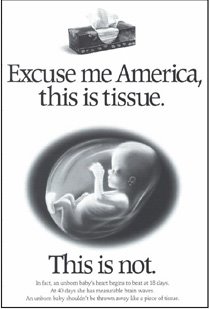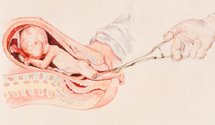The Rosa Acunas Of The World Deserve Better. They Deserve All The Information
 In yesterday’s edition of The Bulletin,
In yesterday’s edition of The Bulletin, I covered the news about this NJ Supreme Court ruling just a couple days ago, making special reference to the one question that must always be asked in discussions about the entity growing within the body of a pregnant woman.
Then yesterday I blogged about the upcoming art exhibit crafted by Naomi Kasumi, a Japanese woman whose experience with abortion is partly summed up in these words of hers:
Since 1998, I have been making hand-made objects spontaneously, and obsessively, as a therapeutic, redemptive action, as a way to atone for my sin. The loss of this tiny life has led me to create repetitive objects, re-creating the same object and same action over and over, day and night. This ritual seems timeless. Sharing the truth of my experience with others publicly is my catharsis and part of my healing process.
Columnist Frank Diamond draws many of the elements of these stories together when he tells the story of George Zallie.
Last week's decision by the New Jersey Supreme Court in the abortion case Acuna v. Turkish hit so close to home for George Zallie that he can't even speak about it. Zallie is a Cherry Hill resident whose daughter, Stacy, committed suicide in 2002. He learned afterwards that Stacy had been suffering from depression because of an abortion she'd had. Zallie believes that the medical community let his daughter down by not warning her of the possible psychiatric ramifications of terminating a pregnancy, and he's turned that belief into a crusade.
His Stacy Zallie Foundation offers counseling for post-abortive women suffering from depression. He's also lobbying the American Psychiatric Association to provide better information about the risk of abortion but, so far, has gotten no response.
That's because the entire counseling profession - psychiatrists, psychologists, social workers - is so infected with political correctness that it refuses to concede that abortion can be anything other than a liberating experience. After all, if a woman could be psychically scarred by abortion, might that not imply that the procedure isn't simply a routine affair, like having wisdom teeth pulled?
Diamond gives little evidence of being a principled “pro-lifer” but much evidence of being a true human being and poses very reasonable questions about the convoluted and bizarre status quo of legalized child killing.
What can we do to get more people making these observations and asking these sort of questions?
His article appears below.
**********
N.J. Supremes Issue Flawed Abortion Ruling
Last week's decision by the New Jersey Supreme Court in the abortion case Acuna v. Turkish hit so close to home for George Zallie that he can't even speak about it. Zallie is a
His Stacy Zallie Foundation offers counseling for post-abortive women suffering from depression. He's also lobbying the American Psychiatric Association to provide better information about the risk of abortion but, so far, has gotten no response.
That's because the entire counseling profession - psychiatrists, psychologists, social workers - is so infected with political correctness that it refuses to concede that abortion can be anything other than a liberating experience. After all, if a woman could be psychically scarred by abortion, might that not imply that the procedure isn't simply a routine affair, like having wisdom teeth pulled?
Zallie is engaged in a public effort to help an at-risk group. He's also fighting a personal battle. He couldn't comment on Acuna v. Turkish because he's suing Stacy's psychiatrist. Still, the case resonates with him because it deals with just what a physician needs to tell a patient who is weighing whether to have an abortion.
In 1996, Rosa Acuna discovered that she was six to eight weeks pregnant. When she asked her gynecologist, Dr. Sheldon Turkish, if there was a baby inside her, she says that he responded, "Don't be stupid; it's only blood," according to the New Jersey Supreme Court decision. Turkish doesn't remember exactly what he said, but he believes that he probably told Acuna that what was inside her "is just tissue at this time." Acuna signed a consent form acknowledging that "the doctor had explained all the risks and complications to her."
There is no mention in the court decision that Acuna was given any information regarding what to do in case she felt depressed after the abortion. Zallie contends that few women are given such guidance.
Acuna had the abortion, and it might have ended there except that something had gone terribly wrong. In the following weeks, she experienced bleeding. Finally, after about a month, she was admitted to
"What happened?" a recovering Acuna asked a nurse. According to court documents, "The nurse replied that 'the doctor left parts of the baby inside of you.'" The realization that it had been more than just "blood" or "tissue" sent Acuna into emotional distress until she was finally diagnosed with post-traumatic stress disorder.
What the New Jersey Supreme Court last week found important was that "she understood that without some intervening circumstance or medical procedure, a child would be born, but what she needed to hear on the day of her visit to [Turkish's] office was that she was carrying 'an existing living human being.'"
Well, the court ruled, maybe Acuna needed to hear that, but Turkish was under no obligation to say that "an abortion results in the killing of a family member." What Acuna expected from her doctor, the court decided, cuts to the core of an issue that theologians, physicians, and philosophers have been unable to resolve: When does life begin?
"We are not unmindful of the raging debate that has roiled the nation and of the sincerely and passionately held beliefs by those on opposite sides of the debate."
The court added that "Acuna must demonstrate that Dr. Turkish withheld medical information that a reasonably prudent pregnant woman in like circumstances would have considered material before consenting to the abortion."
Yet, wouldn't a "reasonably prudent pregnant woman" want to know that having an abortion might result in depression or post-traumatic stress disorder? Zallie argues that people on both sides of the abortion debate - those who claim to care only about the mother's welfare as well as those who say they're looking out for the baby - should be able to reach some sort of agreement about providing post-abortive counseling.
You would think that pro-choicers would be OK with a doctor or psychiatrist saying something like this: "Be mindful that some women - not all or even most, but some - do experience acute depression after having an abortion. It may well be because the crazy pro-lifers insist on saying that abortion is murder and try to make you feel guilty. Regardless of why you may be feeling depressed or anxious, just remember not to hesitate to come to me for help. I can get you counseling."
This is the least that should be done. Think of all the outreach programs for women suffering from post-partum depression. Think of all the segments on television news magazines that have focused on that very real problem. Now, do you remember ever seeing post-abortive syndrome featured on a talk show?
The pro-choice side claims that there's not enough evidence to suggest that post-abortive syndrome exists. Then, because it controls the universities and organizations such as the APA, it stymies any attempt to study the issue. Meanwhile, the thousands of stories about post-abortive syndrome are derided as being merely anecdotal.
The result: psychiatrists in lockstep interpret that ancient tenet of healing, "First, do no harm," as meaning, "Do nothing." Meanwhile, thousands of post-abortive women suffer in isolation. The Rosa Acunas of the world deserve better. They deserve all the information.
Labels: abortion stories, twisted ideology, what is the Unborn?


























0 Comments:
Post a Comment
<< Home